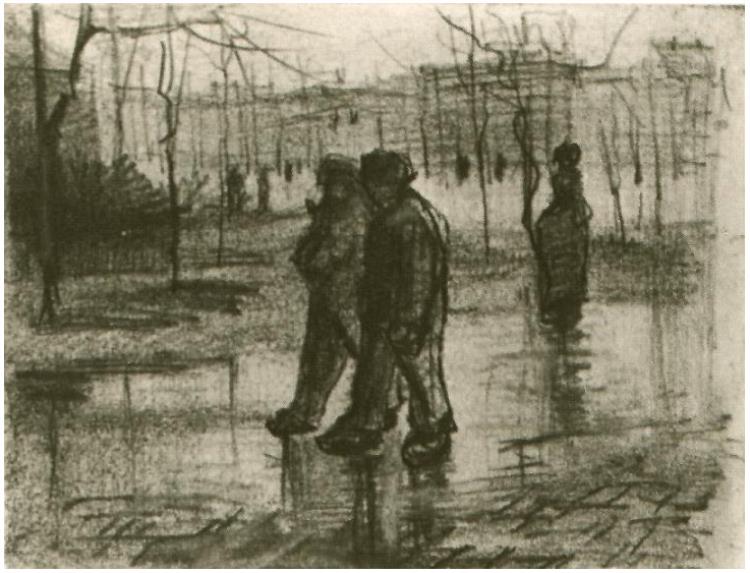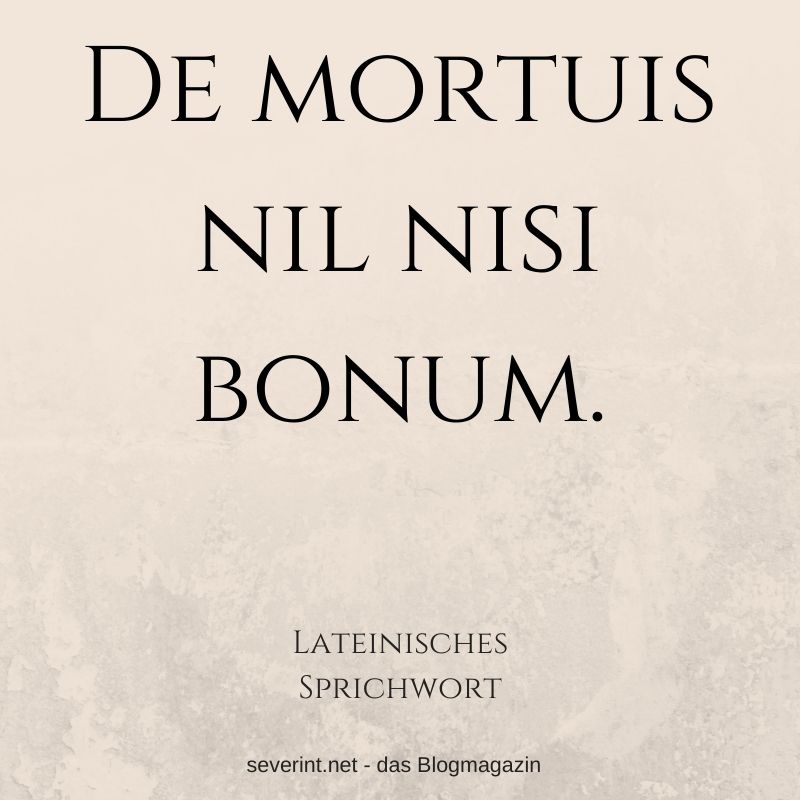
DE MORTUIS NIL NISI BENE
De Mortuis Nil Nisi Hebraice? 51 same time an impressive continuity. Nearly everything appearing in eleventh- and twelfth-century inscriptions, both the more formulaic and the freely composed phrases, as well as some much older elements, was used and reused in constantly varying and geographically dispersed contexts throughout the following.

De mortuis nil nisi bonum 11 oz Ceramic Mug De mortuis nil nisi bonum Mugs CafePress
The Latin De mortuis nil nisi bonum, which translates literally as 'About the dead nothing unless (it is) good', is an abbreviation of the maxim De mortuis nil nisi bonum dicendum est (i.e., 'About the dead nothing is to be said unless it is good'). The maxim is sometimes quoted in even more abbreviated forms (simply as De mortuis or as Nil nisi bonum) on the assumption that the person.

De mortuis nil nisi bene Amagi Radio
The character Shamrayev conflates it with the phrase de mortuis nil nisi bonum (in the alternative form: de mortuis, aut bene aut nihil: "of the dead, either [speak] good or [say] nothing"), resulting in "de gustibus aut bene, aut nihil", "Let nothing be said of taste but what is good." See also. List of Latin phrases; References

Lateinisches Sprichwort De mortuis nil nisi bonum
De mortuis nil nisi bonum is a Latin phrase that means speak no ill of the dead. However, common law principle dictates that defaming a deceased person is not actionable. A legal representative or heir of a deceased person approach a court for defamation of a dead person. The legal meaning is contradictory to the colloquial meaning that says it.

Klangbilder 2019 De mortuis nil nisi bene Teil1 Reinhard Haberfellner
De mortuis nil/nihil nisi bene [dicendum (est)] „Von Verstorbenen [(ist)] nur in guter Weise [(zu) sprechen]" - Lateinische Übersetzung einer gleichbedeutenden, ursprünglich Chilon von Sparta zugeschriebenen griechischen Wendung: Τὸν τεθνηκότα μὴ κακολογεῖν, γῆρας τιμᾶν ( Ton tethnēkota mē.

V48 De Mortuis Nil Nisi...
The meaning of DE MORTUIS NIL NISI BONUM is of the dead, (say) nothing but good.

de mortuis nil nisi bene YouTube
Here is the related Wikipedia entry. Added later: The Hungarian sources claim that there's a very significant semantic difference, as De mortuis nil nisi bene should be interpreted as one should not make false claims about the deceased, i.e., also reveal the unpleasant truth. This is the exact opposite of De mortuis nihil nisi bonum.

de Mortuis Nil Nisi Bona 9781331961420 Spicer Pegler Boeken bol
There's an old, and I guess relatively famous, aphorism "De mortuis nil nisi bene dicendum" ("Of the dead speak nothing but good"). I'm wondering if there are any classical Latin counterpoints or rebuttals to this. In particular I wonder one might something to the effect: "Criticize the departed only with love and noble intentions."

De mortuis nil nisi bene TShirt Zazzle.co.uk
Mathijsen, Marita. "De mortuis nil nisi bene The Influence of Romantic Friendship on the Genesis of Some Nineteenth-Century Publications" In Produktion und Kontext: Beiträge der Internationalen Fachtagung der Arbeitsgemeinschaft für germanistische Edition im Constantijn Huygens Instituut, Den Haag, 4. bis 7.März 1998 edited by H.T.M. van Vliet, 237-244.

De Mortui Nil Nisi Bene YouTube
De mortuis nil nisi bonum explained. The Latin phrase Latin: mortuis nihil nisi bonum (also Latin: De mortuis nil nisi bene [dicendum]) "Of the dead, [say] nothing but good", abbreviated as Latin: Nil nisi bonum, is a mortuary aphorism, indicating that it is socially inappropriate to speak ill of the dead as they are unable to justify themselves.

De Mortui Nil Nisi Bene YouTube
nil nisi bonum (about the dead say) nothing unless (it is) good: Short for nil nisi bonum de mortuis dicere. That is, "Don't speak ill of anyone who has died". Also Nil magnum nisi bonum (nothing is great unless good), motto of St Catherine's School, Toorak, Pennant Hills High School and Petit Seminaire Higher Secondary School. nil nisi malis.

De mortuis nil nisi bene Ein Nachruf zu Alan Wake Videospielkombinat
De mortuis nil nisi bene. As I ask myself how Erwin Panofsky would react to this choice of motto, I can hear his voice saying, "But, Bill, that doesn't mean that you have to con-fine yourself only to good things in speaking about me; if that were the case, we would have to say De mortuis nil nisi bonum. The adverb bene in this context simply means,

De Mortuis Nihil Nisi Bene YouTube
about the dead, nothing unless a good thing. From de mortuis nil nisi bonum dicendum est ("nothing must be said about the dead except the good"), attributed by Diogenes Laërtius to Chilon. In legal contexts, this quotation is used with the opposite meaning: defamation of a deceased person is not a crime. In other contexts, it refers to taboos.

de mortuis nil nisi bene YouTube
The Latin phrase mortuis nihil nisi bonum (also De mortuis nil nisi bene [dicendum]) "Of the dead, [say] nothing but good", abbreviated as Nil nisi bonum, is a mortuary aphorism, indicating that it is socially inappropriate to speak ill of the dead as they are unable to justify themselves.. The full sentence (De mortuis nil nisi bonum dicendum est) translates to "Of the dead nothing but good.

Klangbilder 2019 De mortuis nil nisi bene Teil1 Reinhard Haberfellner
The Latin phrase De mortuis nil nisi bonum dicendum est, "Of the dead nothing but good is to be said." — abbreviated Nil nisi bonum — is a mortuary aphorism indicating that it is socially inappropriate for the living to speak ill of the dead who cannot defend or justify themselves. The full Latin sentence usually is abbreviated into the.

De Mortuis Nil Nisi Bona Being a Series of Problems by Pegler, Spicer Nils, Problem, Bona
The character Shamrayev conflates it with the phrase de mortuis nil nisi bonum (in the alternative form: de mortuis, aut bene aut nihil: "of the dead, either [speak] good or [say] nothing"), resulting in "de gustibus aut bene, aut nihil", "Let nothing be said of taste but what is good." [4] See also. List of Latin phrases; Related Research Articles